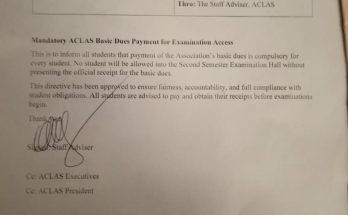The issue of school fees increment is certainly not news. What it is, however, is a recurring challenge that students have slowly begun to come to terms with. What began as a tense negotiation in the past administration which eventually led to a protest in UI has snowballed into a challenge which the new administration inherited. This matter remains unresolved, and with every new update or lack of update, the tension grows.
When the revised fees were announced, there were loud complaints across faculties, especially from students who bore the brunt of the increment. It was a painful reminder of the harsh economic reality facing many Nigerian families. What makes it even more disheartening is the irony: education, which is seen as the ticket to a better economic life, is increasingly becoming unaffordable.
The Students’ Union (SU), expected to be the loudest voice of the student body, has been criticized in recent weeks as the deadline for payment approached, passed, and now is closer again as the extension comes to an end. More than the fee itself, what has stirred complaints among students is the perceived silence and inaction from the SU executives. The frustration was heightened even more by the indefinite postponement of the Students’ Congress, a crucial platform for student dialogue.
For many, the Congress was supposed to be a place where students could express themselves in hopes of being heard. But its suspension left a bitter taste in the mouths of those who had hoped it would aid dialogue and possibly stronger action from the union executives.
Tolu, a 400-level student in the Department of Communication and Language Arts said, “This ought to be the time the SU executives speak up the most and actually do something!” She emphasized that the Congress was not just another platform but a necessary space for airing concerns. According to her, its postponement was quite sad.
Sharing a similar sentiment, Busolami, another 400-level student from the same department, expressed her view with the SU’s current handling of the situation. “I honestly haven’t heard much from them since they got into office, especially on this school fees matter. So now postponing the Congress, indefinitely? That’s not a good look at all,” she said. Her concern reflects what many students feel: that the silence, whether intentional or not, feels like inaction in a critical moment.
However, Kehinde, a 200-level student in the Department of English, offered a different perspective. She said, “They are also students just like us. I believe they might actually be trying their best.” To her, the pressure on the SU is a lot, and the lack of visible results doesn’t necessarily mean a lack of effort.
To better understand the current state of things, the SU Public Relations Officer, Ezekiel Adekanmbi, popularly known as Eazy clarified that the postponement of the Congress was not due to a lack of concern or responsiveness. “The postponement of the Congress wasn’t out of good or bad will. A quorum wasn’t reached and any actions taken from a Congress without a Quorum is unconstitutional and the resolutions is null and void hence the postponement,” he explained.
When asked what the ongoing efforts to address the fee issues, he said “There’s a lot of ongoing efforts to address the issues. The students union has done a lot of consultations and engaged all necessary stakeholders about the situation since the very beginning the fees was released. Part of our ongoing effort has shown in the 50k reduction in fees of students from faculty of technology.”
Despite this progress, many students remain unconvinced even though the problem might not necessarily be a lack of effort but a lack of communication. Just like Busolami, many students might not be aware of the full extent of these engagements and action being taken, leading many students to assume that nothing has been happening.
With just hours left before the extension expires, the tension on campus is evident across departments and faculties. Students are sourcing for last-minute funds, reaching out to all possible channels of support from family, friends and even NELFUND.
What is yet to be seen is what happens after the extension deadline passes and how it will be handled by the union. Only time will tell.
But one thing is clear: the price of education is rising, and for students, the cost is more than just financial. It is emotional, social, and increasingly, political.




